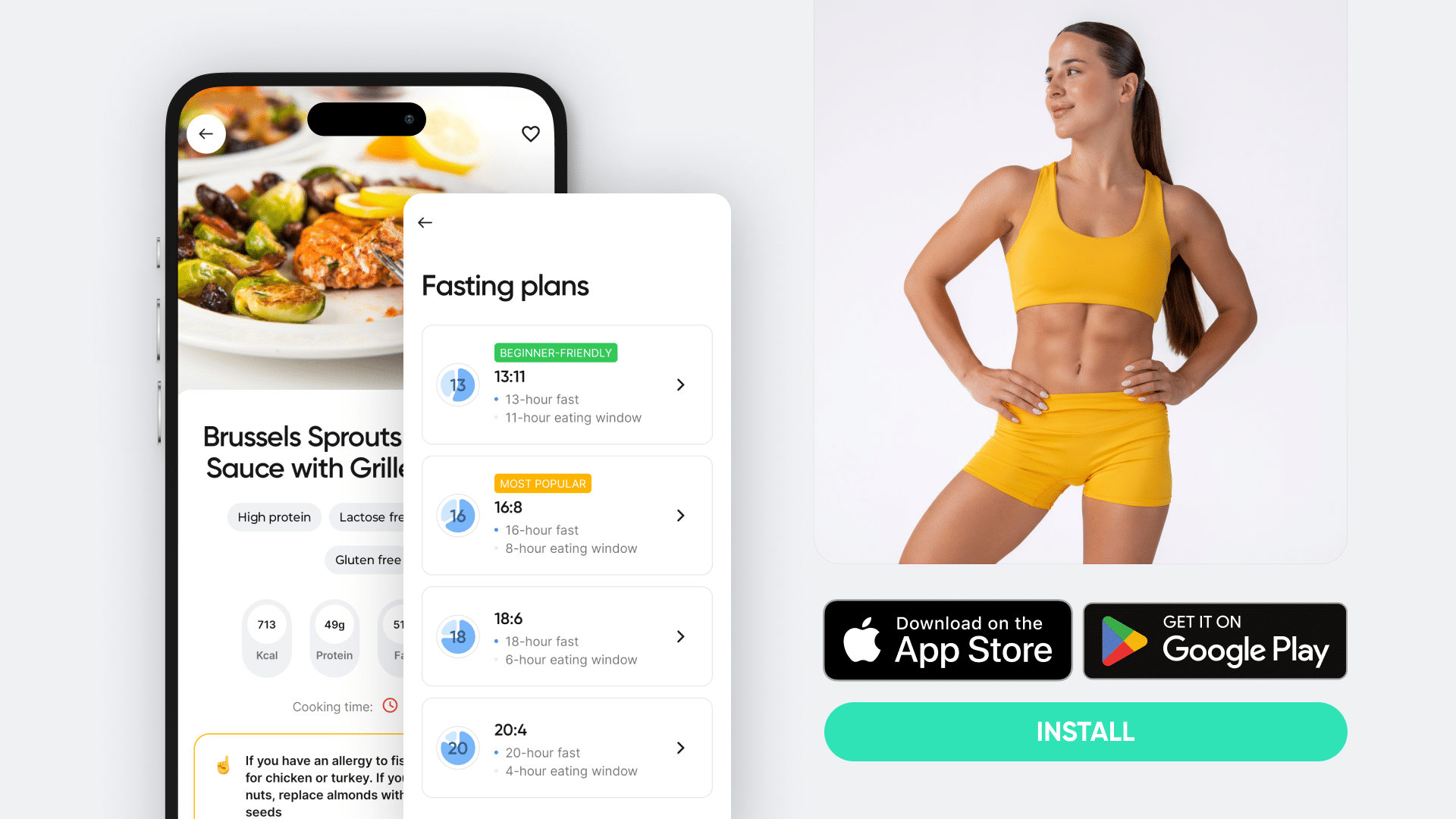Fasting has long been a part of human culture and tradition. In ancient times it was seen as a spiritual practice, a means of cleansing the body and mind after days of indulgence. Sometimes, it was out of bare necessity when food was scarce.
Over time, the benefits of fasting have evolved from purely spiritual to incredibly health-focused. Faced with a sedentary lifestyle and a highly processed food environment, there’s only so much our bodies can handle.
Intermittent Fasting (IF) is a dietary approach that involves alternating between periods of eating and fasting (6).
Unlike traditional diets that restrict certain food groups or rely on calorie counting, IF focuses on when you eat rather than what you eat. It is not a diet in the conventional sense, but rather a pattern of eating.
IF has gained popularity in recent years due to its potential health benefits and weight loss effects. But before we dive into those, let’s start with the basics.
What Are The Basic Rules of Intermittent Fasting?
The golden rule of IF is to alternate between periods of eating and fasting. There are several methods of intermittent fasting, but the most common ones include (5):
- Time-Restricted Feeding: This involves eating only during a specific window of time each day, typically 8-10 hours, and fasting for the remaining 14-16 hours. 16/8 intermittent fasting is one example of TRE; it involves restricting your daily eating window to 8 hours and fasting for the remaining 16 hours.
- The 5:2 Diet: With this method, you eat normally five days a week and restrict your calorie intake to 500-600 on two non-consecutive days.
- Eat-Stop-Eat: This method involves a full 24-hour fast once or twice a week.
- Alternate-Day Fasting: As the name suggests, this involves fasting every other day, with some versions allowing for around 500 calories on fasting days.
There is no “best” method of intermittent fasting, and different people may find success with different approaches.
Reasons why BetterMe is a safe bet: a wide range of calorie-blasting workouts, finger-licking recipes, 24/7 support, challenges that’ll keep you on your best game, and that just scratches the surface! Start using our app and watch the magic happen.
However, the pros and cons of intermittent fasting 16/8 make it a popular choice for beginners. It is:
- Easy to follow: 16/8 is as simple as skipping breakfast and eating your first meal at noon, or finishing dinner by 6 pm and fasting until 10 am the following day. Most fasting hours are spent sleeping.
- Flexible: You can choose your eating and fasting windows based on your schedule and preferences. It also allows for some flexibility in case of social events or unexpected changes in plans.
- Sustainable: You’re not restricting specific food groups or counting calories.
- Long enough to be effective: 16 hours of fasting allows the body to enter a state of ketosis, where it burns fat for energy (10). It may also promote other benefits, such as increased human growth hormone (HGH) levels and improved insulin sensitivity (2, 6).
As with any new routine, you may experience hunger, headaches, or fatigue during the first few days or weeks. This is normal as your body adapts to this new eating pattern.
Other rules if intermittent fasting are:
Know What Breaks a Fast
You’re not allowed to eat or drink any calories during fasting hours. For IF to be effective, you must go without any calories for a certain period.
However, there are some exceptions to this rule:
- Water: Staying hydrated is essential during fasting, so drink plenty of water.
- Black coffee and tea: These beverages contain caffeine, which may suppress appetite (1) and provide energy during fasting periods. Just make sure not to add any sugar or milk.
- Apple cider vinegar: Some people believe that a small amount of diluted apple cider vinegar can help with fasting, but there isn’t enough scientific evidence to support this claim. The calorie content is quite low, so it’s unlikely to break a fast.
- Supplements: Certain supplements, such as vitamins and minerals, are fine to take during fasting hours. However, others that contain calories or protein may disrupt the fasting state. Still, others are better taken with food for optimal absorption and/or minimal gastrointestinal side effects.
Our guide on Zero Calorie Drinks for Intermittent Fasting goes into further detail on what beverages you can consume during fasting periods.
Know How To Break Your Fast
Breaking your fast is just as important as the fast itself. When your body has been in a fasting state, it’s essential to ease back into eating to prevent digestive discomfort or other issues.
- Start with a small meal: Breaking your fast with a large and heavy meal can cause stomach upset. Instead, opt for a small meal that is easy to digest. Bone broth or a smoothie with protein and healthy fats are good options.
- Eat slowly: Take your time to eat and listen to your body’s hunger cues. It may take some time for your digestive system to adjust after a fast.
- Stick to whole, nutrient-dense foods: After fasting, it’s important to nourish your body with wholesome foods that provide essential nutrients.
- Avoid overeating: It can be tempting to overeat after a fast, but this can lead to discomfort and undo the benefits of fasting. Listen to your body’s signals and stop eating when you feel satisfied.
Our Intermittent Fasting Meals guide offers more tips on how to plan and prepare healthy meals while following an intermittent fasting routine.
Read more: How Long Does It Take for Intermittent Fasting To Work?
Customize Your Intermittent Fasting Schedule
Intermittent fasting isn’t a one-size-fits-all approach. Some people may prefer a longer fasting window, while others may find success with shorter periods.
Tune in to your body and adjust your schedule accordingly. If you find yourself feeling overly hungry or fatigued during your fasting hours, try shortening the window or increasing the number of eating days per week.
On the other hand, if you feel comfortable and energized with your current schedule, stick with it. You’re most likely to see results from intermittent fasting if you can stick to it long-term.
Our Endomorph Intermittent Fasting guide illustrates how to customize your fasting schedule based on your goals and lifestyle.
What Not To Do In Intermittent Fasting?
While practicing IF, you shouldn’t:
Eat/Drink Anything with Calories
This includes sugary drinks, such as soda or juice, and snacks like chips or cookies.The goal of IF is to reduce calorie intake during certain periods of time, so consuming foods with calories defeats the purpose.
Binge Eat During Eating Windows
A common mistake people make when practicing IF is overeating during their designated eating windows. This can hinder weight loss and negate any potential benefits of IF.
Neglect Proper Hydration
Even though you’re not eating or drinking anything with calories, it’s important to stay hydrated while practicing IF. Water and herbal teas are great options for staying hydrated without breaking your fast.
Overdo it on Cheat Days
While occasional cheat days are acceptable, overdoing it can lead to unhealthy habits and slow down progress. Moderation is key when incorporating cheat days into your IF routine.
Ignore Food Quality
Just because you’re restricting your eating window doesn’t mean you should ignore the quality of the food you consume. Focus on incorporating whole, nutrient-dense foods into your meals during eating windows for optimal health benefits.
Skip Exercise
While not necessary for weight loss with IF, regular exercise can greatly enhance its effects and improve overall health (13). Find a form of physical activity that you enjoy and make it part of your routine.
Neglect Sleep
Quality sleep is essential for overall health, and neglecting it can hinder weight loss progress (11). Aim for 7-9 hours of uninterrupted sleep each night to support your IF journey.
BetterMe app will provide you with a host of fat-frying fitness routines that’ll scare the extra pounds away and turn your body into a masterpiece! Get your life moving in the right direction with BetterMe!
How Much Weight Can You Lose In a Month with Intermittent Fasting?
Most people can expect to lose 1-2 pounds per week with intermittent fasting if they create an overall calorie deficit. This equates to about 4-8 pounds per month.
Weight loss is often one of the most sought-after benefits of intermittent fasting (7). It’s why many ask for the best intermittent fasting window to lose belly fat, or the most effective schedule for weight loss.
However, the amount of weight you can lose in a month with IF depends on various factors, including your starting weight, body composition, and adherence to your fasting schedule.
- Starting weight – you’re more likely to lose more weight if you have a higher starting weight, as there is generally more excess fat to lose.
- Body composition – those with a higher percentage of body fat may see faster results compared to those with less body fat.
- Adherence – consistent adherence to an intermittent fasting routine is key for achieving weight loss. Skipping fast days or overeating during eating windows can slow down progress.
Other Factors to Consider:
Weight loss is not the only measure of success with IF. Intermittent fasting might have additional benefits beyond weight loss, including:
- Improved heart health – when you fast, your body has time to repair and reduce inflammation, which may improve heart health (8).
- Lowered risk of type 2 diabetes – IF can help regulate blood sugar levels and decrease insulin resistance, possibly reducing the risk of developing type 2 diabetes (9).
- Better brain function – studies have suggested that intermittent fasting may confer benefits for those with neurodegenerative diseases (12).
- Increased longevity – research in animals suggests that intermittent fasting may increase lifespan and promote cellular repair and regeneration (3).
- Better gut health – fasting affects the composition of gut bacteria, which can improve overall gut health and digestion (4).
So, while weight loss is a common goal, it’s important to also focus on the many other potential benefits of intermittent fasting.
How Should a Beginner Start Intermittent Fasting?
A beginner should start slow and gradually build up their fasting windows. Here are some tips to get started:
- Choose a schedule that works for you – there is no one-size-fits-all approach to intermittent fasting, so choose a schedule that aligns with your lifestyle and preferences.
- Start with shorter fasts – if you’re new to intermittent fasting, it may be more sustainable to start with shorter fasting windows, such as 12-14 hours.
- Ease into longer fasts – as you become more comfortable with intermittent fasting, gradually increase your fasting window over time.
- Hydrate with zero-calorie drinks – staying hydrated is important during fasting periods, and zero-calorie drinks like water, herbal tea, and black coffee are acceptable.
- Listen to your body – if you feel overly hungry or fatigued it’s okay to adjust your fasting window. Intermittent fasting should not feel restrictive or uncomfortable.
- Incorporate nutrient-dense foods – when breaking your fast, focus on incorporating whole, nutrient-dense foods into your meals to support overall health.
- Consult with a healthcare professional – if you have any underlying health conditions or concerns, it’s always best to consult with a healthcare professional before starting any new diet or eating pattern.
Read more: What Can I Eat During Intermittent Fasting?
FAQs
Is Fasting from 7 pm to 11 am?
Yes, fasting from 7 pm to 11am constitutes a 16-hour fasting window, which is a common intermittent fasting schedule known as 16/8 fasting.
Why Am I Not Losing Weight on 16 8 Fasting?
Several factors could be hindering weight loss on a 16/8 fasting schedule. You might be overeating during your eating window or consuming too many high-calorie, nutrient-poor foods.
Lack of physical activity, high stress levels, or inadequate sleep can also stall weight loss. More importantly, if you’re not consistent with your fasting schedule and have frequent cheat days, it can slow down progress.
What Foods to Avoid During Intermittent Fasting?
During your eating window, try to avoid foods high in added sugars and unhealthy fats, such as fast foods, sugary drinks, and ultra-processed snacks.
Instead, focus on consuming whole, nutrient-dense foods, which can help you feel fuller longer and provide the nutrients your body needs.
What Is the Best Intermittent Fasting Window to Lose Belly Fat?
The best intermittent fasting window for losing belly fat is any that you can stick to for a long enough period. However, many find success with the 16/8 method, fasting for 16 hours and eating during an 8-hour window.
This schedule seems to strike a balance between being achievable for many and delivering effective results. It’s advisable to pair fasting with a nutrient-rich diet and regular exercise for best results.
The Bottom Line
Intermittent fasting is a popular and effective approach for weight loss and overall health. However, it’s important to avoid common mistakes and focus on creating a sustainable routine that works for you.
By incorporating healthy eating habits and finding a balance with exercise and sleep, intermittent fasting can provide numerous benefits beyond just weight loss. Remember to start slow and listen to your body, and consult with a healthcare professional if needed.
DISCLAIMER:
This article is intended for general informational purposes only and does not serve to address individual circumstances. It is not a substitute for professional advice or help and should not be relied on for making any kind of decision-making. Any action taken as a direct or indirect result of the information in this article is entirely at your own risk and is your sole responsibility.
BetterMe, its content staff, and its medical advisors accept no responsibility for inaccuracies, errors, misstatements, inconsistencies, or omissions and specifically disclaim any liability, loss or risk, personal, professional or otherwise, which may be incurred as a consequence, directly or indirectly, of the use and/or application of any content.
You should always seek the advice of your physician or other qualified health provider with any questions you may have regarding a medical condition or your specific situation. Never disregard professional medical advice or delay seeking it because of BetterMe content. If you suspect or think you may have a medical emergency, call your doctor.
SOURCES
- Caffeine, coffee, and appetite control: a review (2017, pubmed.ncbi.nlm.nih.gov)
- Fasting enhances growth hormone secretion and amplifies the complex rhythms of growth hormone secretion in man. (2000, ncbi.nlm.nih.gov)
- Intermittent and periodic fasting, longevity and disease (2021, ncbi.nlm.nih.gov)
- Intermittent fasting and gut microbiota (2019, ncbi.nlm.nih.gov)
- INTERMITTENT FASTING AND HUMAN METABOLIC HEALTH (2016, ncbi.nlm.nih.gov)
- Intermittent Fasting and Metabolic Health (2022, ncbi.nlm.nih.gov)
- Intermittent fasting and weight loss (2020, ncbi.nlm.nih.gov)
- Intermittent Fasting in Cardiovascular Disorders—An Overview (2019, mdpi.com)
- Intermittent fasting: is there a role in the treatment of diabetes? A review of the literature and guide for primary care physicians (2023, biomedcentral.com)
- Intermittent fasting: the science of going without (2013, ncbi.nlm.nih.gov)
- Sleep Deprivation: Effects on Weight Loss and Weight Loss Maintenance (2022, mdpi.com)
- The Effects of Intermittent Fasting on Brain and Cognitive Function (2023, mdpi.com)
- Weight-Loss and Maintenance Strategies (2004, ncbi.nlm.nih.gov)










